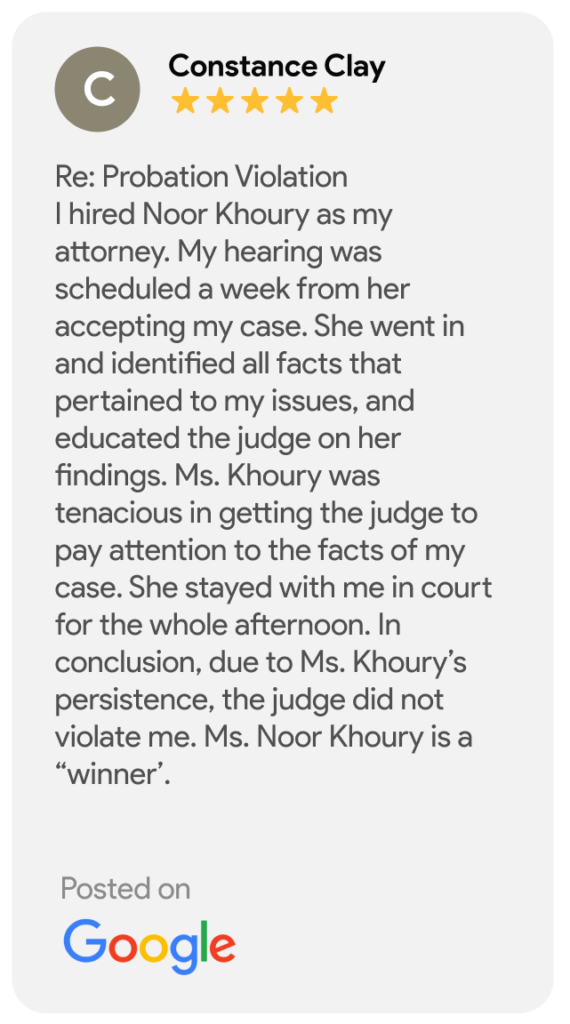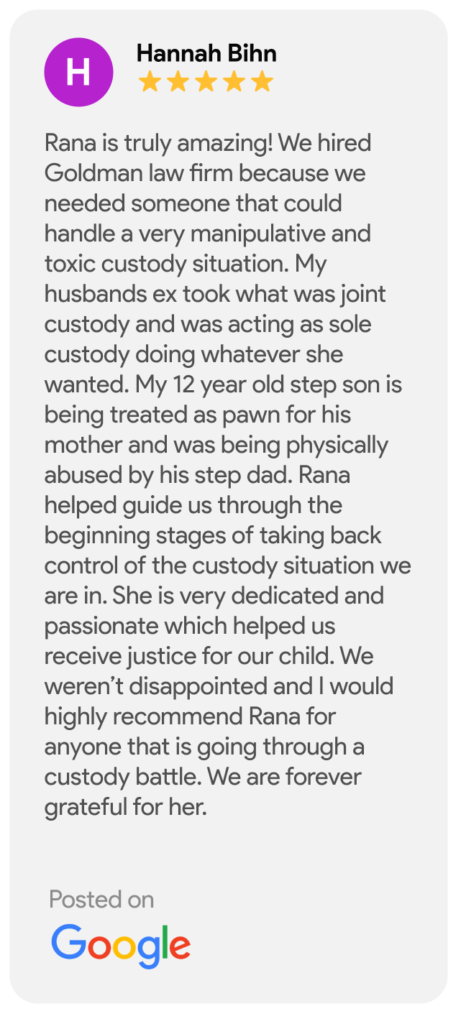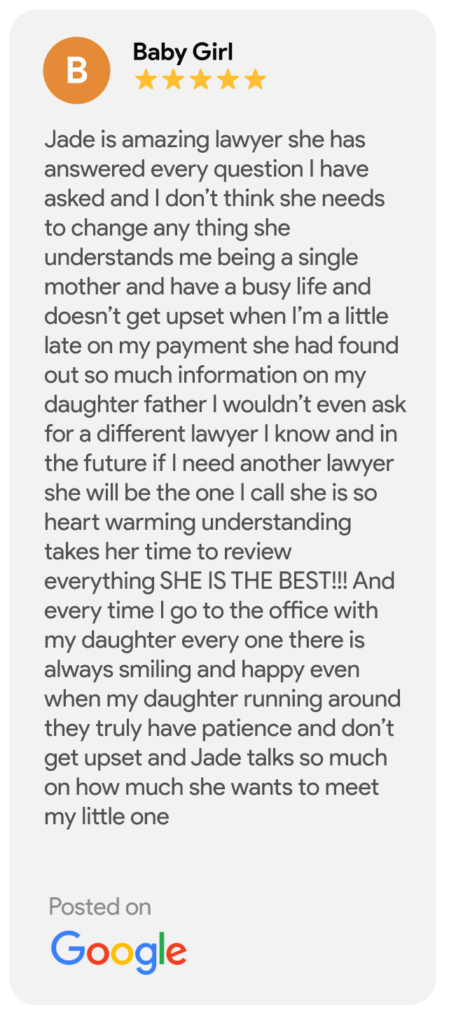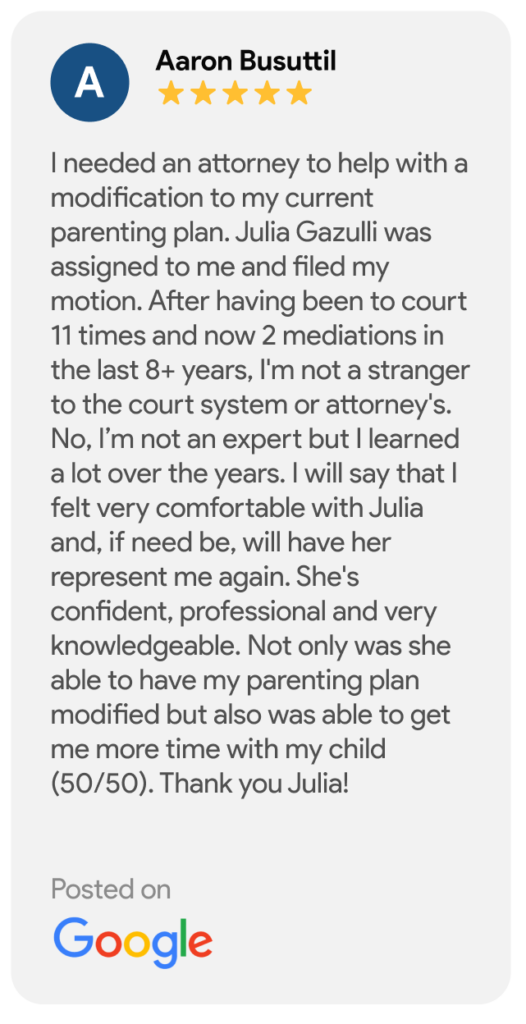Michigan Child Custody (Frequently Asked Questions) – ChooseGoldman
The questions provided below are frequently asked questions regarding child custody in the state of Michigan. If you find that your question is not answered below please contact us for a consultation.
Q: At what age can a child decide where to live?
A: A child can make a preference about where to live at the age of eighteen. However, the rational preference of the child is considered as one of the determining factors before the child reaches eighteen if the court thinks the child is mature enough to make such a choice.
Q: Who is going to get the custody of a child?
A: Custody of a child is determined in the best interests of the child. Courts in Michigan apply twelve factors to decide custody arrangement of a child in the best interests of the child involved. The court will have to consider the circumstances of parenting before the filing of divorce or custody case. The court must resolve whether there is a proved custodial background with either parent or both parents. A proved custodial background is a psychological and physical setting which grows over a considerable time and long duration.
Q: What is the difference between sole and joint custody?
A: Custody of a child can be of two types, legal custody and physical custody. Legal custody is the capacity to take decisions for the vital life events of a child, such as education, child care, health care, and general welfare. Joint legal custody allows both parents to make these decisions by consulting with each other. On the other hand, sole legal custody conveys one parent all decision-making rights. Physical custody means the actual physical residence where the child will live. Joint physical custody enables the child to keep hold of a residence with both parents. In a joint custody, one parent secures the responsibility of primary custodian and the other parent gets parenting time based on a predetermined schedule. On the contrary, sole physical custody denotes that the child will reside with only one parent. The other parent may or may not get visitation rights or parenting time.
Q: What is parenting time?
A: In Michigan, visitation is called parenting time. It is court determined time for each parent to enjoy with their children.
Q: Can a parent decline to permit parenting time to the other parent if that parent doesn’t pay child support?
A: No. Child support and visitation are two different issues. If parenting time or visitation time was determined by an order of a court, a parent may be held in contempt for not permitting the visitation of the other parent. If you do not get a child support payment, you need to contact the Michigan Friend of the Court of the county from where the child support order was given. The Friend of the Court has the authority to enforce child support.
Q: When a custody is determined in a divorce proceeding?
A: The Friend of the Court makes a primary determination early in the proceeding. A recommendation will be made by the Friend of the Court based on information provided by the parents. Each parent then will be able to take a stand against this recommendation and submit evidence to the judge in support of their claim and request the Judge for a different order or recommendation. The parents may also negotiate an agreement for child custody, and the judge will endorse it if it is found to be in the best interests of the children.
Q: What will happen if the parents cannot agree on a custody arrangement?
A: The court will conduct a trial if the parents fail to reach a consensus on an arrangement of custody. At the trial, each parent will be allowed to present evidence in support of their expected custody arrangement. The court may accept one parent’s proposed custody arrangement or order a different custody arrangement it considers is in the child’s best interests.
Q: What can I do if I do not agree with the orders of the judge?
A: An appeal may be made to the Michigan Court of Appeals against any decision made by a family division judge. A parent may also make a request to review a recent decision of the judge.
Q: If I disagree with the referee or the judges decision, is it possible to transfer the case to another county?
A: No, a partys disagreement with the decision made by a domestic relations referee or a judge is not a valid reason for a case to be transferred to another county.
Q: Do I need to take permission of the judge if I want to move out of state with my child?
A: Yes, a parent will have to obtain the judge’s permission to move out of state if that parent was awarded custody of the child. The court will, as a rule, sanction the move if the other parent gives consent and both of the parents sign a stipulation or consent order. If the other parent does not consent, you need to file a motion seeking the court’s permission to move.
Q: Can custody be modified?
A: If there are bona fide grounds or a change in circumstances, custody of a child can be modified. The modification will have to be in the best interests of the children. The parent seeking the modification will have to present evidence to prove that a change has happened or that there are bona fide grounds, and the proposed change is in the best interests of the children.
Q: How many times can the parents request the court to review custody?
A: There is no limit to the number of times the court may review custody of a child. A parent who is requesting a change in custody, however, will have to substantiate a change in circumstances.
Q: Will the Court favor the mother over the father in granting custody?
A: The statutes in this regard are gender neutral. However, many courts still grant initial custody to the mother. Fathers usually encounter a tough legal fight in most courts, but the legal fight can be faced and won with appropriate preparation by the father and his attorney.
Q: What is Parental Kidnapping?
A: In Michigan, it is a crime for a natural or adoptive parent of a child to take the child, or retain the child for more than twenty-four hours, to conceal or detain the child from the other parent who has parenting time rights. Parental kidnapping is a felony which is punishable by up to one year in jail and/or a fine of up to $2,000.
Choose Goldman Today!
Find out how we successfully worked with clients by watching our Testimonial videos.
































